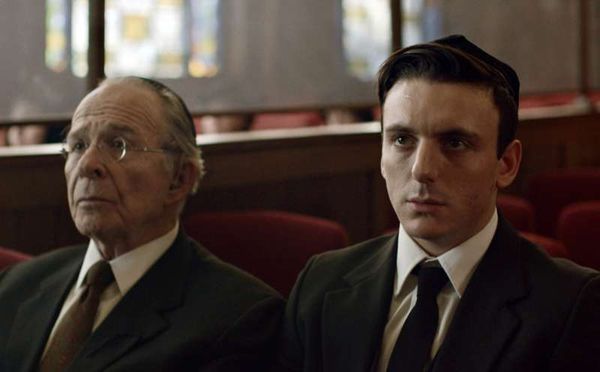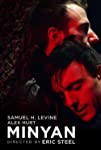Eye For Film >> Movies >> Minyan (2020) Film Review
Minyan
Reviewed by: Jennie Kermode

For many years, filmmakers have striven to communicate the uniqueness of what Jewish people went through in the run-up to the Holocaust, but the problem with uniqueness is just that: it’s hard to relate to, and developments in the political arena in recent years have made it all too apparent that a generation of young people, growing up without close family members who recall that era, have failed to get the message. Eric Steel’s Eighties-set historical drama approaches the problem by way of a stepping stone, setting aside the concern with uniqueness and using a pivotal moment in more recent gay history to draw parallels which help to ease viewers into that troubled social space.
Samuel H Levine, a stage actor whose subtlety on film is admirable, plays David, a young man who is just beginning to discover his sexuality. Raised as a good Jewish boy and Yeshiva student, he seems to have little awareness of anything beyond conventional sexuality (he has one of those mothers who rattles on constantly about eligible women in his age group) and what changes things for him is not a crush or an erotic encounter but the dawning realisation that two of his elderly male neighbours, both Holocaust survivors, are in fact living together as a couple. With his eyes thus opened, he becomes gradually alert to what savvy viewers will have seen all along: that he’s surrounded by sexual opportunities. A first shy venture into a gay bar only serves to highlight his naivety. Men are quietly signalling their interest to him within the day to day landscape of his life, in streets and public buildings and even Jewish community spaces.
Despite this latter element, David’s realisation causes him to worry that he might face rejection by that community, and it’s the tension around this which powers the film. It’s a gently paced tale which will echo the experiences of many viewers, with none of the big moments or high drama of most fictional comings-out. This gradual awakening provides ample opportunity for Levine to display his acting talents, with numerous scenes in which emotional shifts are conveyed through his face even whilst David tries to conceal his feelings from those around him. The stories of the old people with whom he converses are given fresh weight by what is barely stated within the narrative: that this is when it is, and death and destruction are coming for gay men, even if they cannot yet be seen. With a moody jazz score full of languorous clarinets, this is a long cool drink before the unseen war.
There are sex scenes in Minyan, but they are sparing, the film’s real eroticism coming through in quieter moments. There is that sense of relief as David finds other gay men – as much because it enables free conversation as because of the sexual possibilities – and this is paralleled by what the older men, gay and straight, have to say about what it means to be a member of the Jewish tribe. Their emphasis on passing along cultural understanding reflects what the film itself is doing in reflecting on a culture which AIDS very nearly obliterated. It quietly muses on the importance of recognising oneself as a survivor, of thinking not just about what has been lost but about the triumph of living and the beauty of shared moments of understanding.
For those unfamiliar with Jewish culture, a minyan is an assembly of men which must be adequate in number before certain types of worship can take place. In a persecuted community, it is implied, there is no room to foster prejudice; it is vital that everyone be able to play their part. This is a film which will speak volubly to viewers with intersectional identities of various kinds, but it’s so beautifully made, so sensitively delivered, that anybody who loves cinema would be unwise to miss it.
Reviewed on: 07 Jan 2022
















